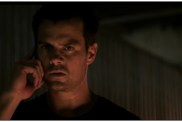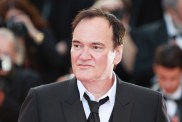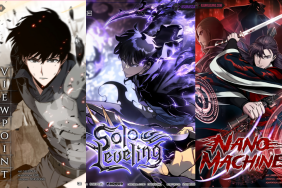Every once in a while, there’s a classic movie re-released by the studios that we here at ComingSoon.net, a site whose very name is dedicated to forthcoming releases, feel worthy of revisiting. Even less often, there’s a movie from the past that’s so unbelievably bad that it’s the funniest and most entertaining movie you’re likely to see in theaters.
The latter is the case with Miami Connection, Richard Park’s 1987 martial arts action thriller that introduced most of the world–or rather the five people who saw the movie–to Florida’s Grandmaster Y.K. Kim, a Korean-born taekwondo master and teacher whose schools had flourished in the ’80s, allowing him to fund the movie in which he would play a key role as the member of a rock group who just happened to be trained in martial arts.
The official synopsis for the movie is as follows: “A martial arts rock band goes up against a band of motorcycle ninjas who have tightened their grip on Florida’s narcotics trade.” And that’s exactly what you get! Seriously, you should watch the trailer here, because it actually makes the movie look better than it is.
In the years since the movie tanked, not even receiving proper distribution, Grandmaster Kim has become an in-demand motivational speaker, and I guess if you were to invest all of your money into a piece of crap like Miami Connection and come out the other side, your story would be quite motivational to anyone.
Back in June, ComingSoon.net had a chance to talk to Grandmaster Kim when his movie played at the New York Asian Film Festival, and it was quite an interesting experience. (He also gave a very unique taekwondo demo, which you can watch at the very end of the interview.) Accompanying the Grandmaster on his trip to New York City was Joseph Diamand, the co-writer of Miami Connection and still one of the Grandmaster’s students after 25 years.
ComingSoon.net: It’s surprising I never heard of this movie when it first came out, but what got you started on wanting to make a movie? I understand you were already a taekwondo master at the time?
Grandmaster Kim: I was very successful as taekwondo Master at that time. Now I’m the most successful martial arts specialist and trainer in the U.S. and perhaps the world. So I went to Korea and I was on a very popular talk show. At that time, action movie director Richard Park, he watched and maybe I did a great job so he flew down to where I lived in Orlando, Florida and he asked me, “Hey, would you like to make a movie with me?” I said, “Yes.” Why? Because I wanted to promote martial arts through screenings just like Chuck Norris did and Bruce Lee.
CS: Had Chuck Norris already been making a lot of movies at that time?
Kim: They already did but I wanted to do the same thing. I announced to the public because I was so proud, “Hey, I will produce the movie “Miami Connection,” to the Central Florida, because I was so excited but the response was terrible. All my friends and community leaders and my media friends, they all came up to me, “Hey Y.K., you are martial arts expert and you are so successful in martial arts but you’re not a moviemaker. Don’t do it.” They say, “In Central Florida, many many people for years and years, they try and not one person who started has finished a film. They all went into bankruptcy. My determination was so strong, nobody could stop that martial arts spirit so I started it. It was so fun. Most of the time I was right, but this time they were 100% right. Physically, mentally, emotionally and financially dried up, I was just totally invested and I was very close to bankruptcy. I had to sit down and asked myself “What should I do?”

CS: This is after you shot the movie or before you even started?
Kim: No, no, after it was shot, because the money dried up right away; I didn’t know making movies was so expensive. My heart told me, “Hey Y.K. Kim, you don’t have that word bankruptcy in your dictionary and your life” so I didn’t stop. I was faced with all kinds of monsters and I overcame them and I finished the movie.
CS: How did you go about casting the movie? Were most of the people in the movie your students?
Kim: Yes, most of the casting, even actors, almost all of them were my students because I had thousands and thousands of students. I was very, very successful.
CS: How did you and Richard Park divide the duties? He was already directing movies.
Kim: Richard Park was the director. I didn’t even know what “producer” meant, but I produced it. I did everything, from casting to location. You name it, many different things.
CS: And you actually co-wrote the movie
Kim: Actually, he brought the storyline. We didn’t even have a script and the storyline was just a couple pages, that’s nothing. If I knew that about the movie, I wouldn’t start it, because I didn’t know when they create a movie they had to have scripts so we developed the storyline and wrote a script.
CS: I think back then, it was more common to make a movie without having a full script because in 1987, there was a lot of money to throw around and someone could just say “Oh, this is a good idea for a movie” so a lot of action movies came about that way.
Kim: (laughs) Yeah, you’re right.
CS: How did the music become incorporated into this? Was that part of the original idea?
Kim: Mr. Diamand, please. (He motions to Joseph to field that one.)
Joseph Diamand: Part of the storyline was that there would be this band and they’d be friends and they’d practice taekwondo and they would be students. Since we had a call for a band, we actually were looking for musicians and luckily, Angelo and Kathy were students of Grandmaster Kim, they were able to write the songs that we performed on stage and help with the onstage choreography and that’s “Friends,” the opening song with the band and then the follow-up with Kathy singing “Against the Ninja,” which was one of the original titles.
CS: Oh, I thought she was singing “Gangster Ninja.”
Diamand: After 25 years that actually sounds better, but back then it was “Against the Ninja.” That’s how the whole music evolved and our special FX guy that did a lot of the make-up was also an accomplished musician, John Le Calm, and he did what I like to call “the kick-ass soundtrack,” kind of a Jan Hammer-esque soundtrack, and that was the second part of the music story. Through our taekwondo family, we actually had a very creative guitar player Roy Sharpe and his band, so they did the closing song and the biker song “Tough Guy” and then the opening credits “Escape from Miami.”
CS: You’re obviously comfortable with the action and martial arts, but were you comfortable with the music? On stage, you don’t seem at all comfortable holding a guitar.
Kim: (shakes head and smiles)
Diamand: He knows.
Kim: I’m not a musician.

CS: Didn’t you think it was a strange idea when they suggested you were going to play in a band?
Kim: I always thought that whatever the director says I follow.
CS: You mentioned Chuck Norris and the show “Miami Vice” is an obvious influence on this, so were there any other influences?
Kim: I wanted to promote martial arts so badly because it changed my life and it’s much bigger than my life, and I strongly believe it will help everybody, because I saw how martial arts made me healthier and stronger and happier. Self-improvement is a certain belief, so I wanted to promote this martial arts philosophy and martial arts discipline all over the world. That is the biggest reason why I started this movie.
CS: Taekwondo is still practiced everywhere–both my nephews are into it–so it did take off and has been big despite the movie. So was “Miami Connection” the breaking point where you decided you’d never make a movie again?
Kim: In ’87, we were not financially successful. I lost almost everything, so financially, I couldn’t do it, so because it already failed, at that time “Miami Connection” was done. I had to rebuild the schools and everything, so I didn’t do it. Now we have a special plan. Our organization promotes traditional martial arts with modern philosophy, so this is something very different from any of the other martial arts systems, like we have five kinds of fitness: physical fitness, mental fitness, financial fitness and life fitness. Full practice martial arts, they will be healthier and stronger and they will be wiser and smarter and they will have peace in their heart so they can have inner power and build self confidence and then financial fitness, they will be wealthier and then with life fitness, they will be a successful leader. Even with full practice martial arts, they will be healthier and wealthier and happier so they can have a successful life, so that organization, we have a plan. We will create a very unique, most exciting and great action film. I think we will make the next one Academy award quality. No question about it.
CS: So now after 25 years, you’re ready to go back into filmmaking? I talk to a lot of independent films and it’s always hard to get movies out there, even now. It’s actually harder because there are a lot more movies and if you make a movie and it flops in theaters, it doesn’t disappear. It’s always around because people will eventually see it on video or cable and this is a good example. 25 years later, more people are going to see it now. Why do you think that this is suddenly getting attention now?
Kim: That’s because I have a plan. I actually had a plan, but I had to postpone for many other reasons. You know, I wrote 30 books and I was too busy involved with other things but this one, the action movie, was very important. To promote martial arts, this is the best tool. Now I feel I can produce a really solid and very unique action movie.
CS: Were you tempted to go back and fix things in “Miami Connection”? George Lucas is constantly changing “Star Wars.”
Kim: Of course. If I could do it nowadays, I’d be more practical and make it more emotional and more philosophical, so everyone can understand easily. Anybody can comment while watching the movie that it’s not just entertaining, but they can learn something and they can use it right away in their lives

CS: You saw the movie last night with an audience and I guess you’ve seen it a few times, so how do you feel about the reaction to it? Do you feel they’re still getting the message even while they’re laughing and having fun?
Kim: Last night, I was really shocked, because I didn’t watch this movie for 25 years. I watched. As it was finishing, there was clapping and laughing and screaming. Good, bad, it doesn’t matter. I was just shocked and I was so happy, but in the 1980s when I went to Hollywood, I showed this film to all major studios and every single studio said, “Hey, this is garbage. Forget it. Don’t waste your time.” So the last hope I had, I went with friends to the Cannes Film Festival to sell it, and they say, “Do not waste your time. This is truly garbage.” But one gentleman said, “If you change it, we can shoot, edit and mix it, I think we have a chance.” So I come back and talked to Joseph Diamand. I didn’t know how to produce a movie actually, so already the director left because his responsibility is to his career, my responsibility was USA and work. He left us so I didn’t know what to do, so I bought books on how to direct and produce a movie, and page by page, then I asked him to help me and I hear he wrote eight books on how to write a screenplay. Then we filmed and we edited and we mixed it. That was really good because why Hollywood didn’t buy was because “Moses Smith,” he’s a good character, but he died, then the bad guy, the white ninja, he’s alive, so we killed the bad guy and we made Moses Smith alive. A few funny things after reediting, I didn’t even notice the beginning when he says, “Hey, look over there,” but there’s nobody there. The reason why was because of lack of English. So they had a picture but it was wrong. “Who is going to buy that movie?” So we changed the whole thing and then we showed the public, but the public response was nothing.
CS: It’s funny that Hollywood wouldn’t want to get behind this, because now they spend hundreds of millions of dollars making movies that are much worse, even from professional directors, and they often make movies that are unwatchable.
Kim: Last night I watched it and everything connected really well. I actually mean it. I told him (points to the rep from Drafthouse Films) and asked them, “Why did you buy this garbage movie?” And yesterday, I watched it and it is very exciting and entertaining.
CS: That’s what I’m saying. It’s more entertaining than most of the movies coming out of Hollywood these days.
Kim: You’re right! You’re right! Thank yoooooooooooou! You are the man! Great, that’s fantastic! Waaaaaaaaaaaaugh!!









